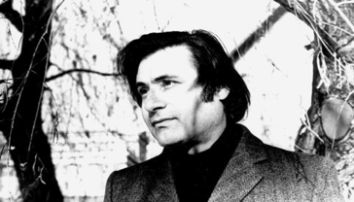by Eliza Waldman
Alfred Schnittke is the composer of almost 70 film scores and a large and varied body of concert works. His music is known for its emotional complexity, and his career has been both expansive and colorful.
 The young Schnittke came from a Russian family of mixed Jewish and Volga-German descent. His father worked as a journalist and translator, and the family moved often to accommodate his work. As a result, though Schnittke was born in Engels, Russia, his first musical studies were in Vienna as a young teen, then when the family moved again, at The October Revolution Music College in Moscow. In 1953, he entered an undergraduate program at the Moscow Conservatory and continued on to pursue graduate studies with Yevegny Golubev and Nikolay Rakov. In 1962, he was offered a job teaching instrumentation at the Moscow Conservatory and began his career as a freelance composer. He supported himself in large part through writing for theater and film, scoring the first of many films to come in 1965.
The young Schnittke came from a Russian family of mixed Jewish and Volga-German descent. His father worked as a journalist and translator, and the family moved often to accommodate his work. As a result, though Schnittke was born in Engels, Russia, his first musical studies were in Vienna as a young teen, then when the family moved again, at The October Revolution Music College in Moscow. In 1953, he entered an undergraduate program at the Moscow Conservatory and continued on to pursue graduate studies with Yevegny Golubev and Nikolay Rakov. In 1962, he was offered a job teaching instrumentation at the Moscow Conservatory and began his career as a freelance composer. He supported himself in large part through writing for theater and film, scoring the first of many films to come in 1965.
“Tango” by Schnittke from Yuri Kara’s 1994 film adaption of the classic novel The Master and Margarita:
Schnittke was influenced by many styles. He was very affected by his early studies in Vienna and also drew from the Russian classical tradition. His early works owe a clear debt to Dmitri Shostakovich, another Russian great who wrote extensively for film. Schnittke also went through a serialist period, though he eventually moved away from serialism after studying the works of Luigi Nono and other avant-garde composers. He moved into a new phase which he referred to as polystylism, a style which meshed many different musical elements into a kind of elaborate pastiche. As the years went on, his approach to polystylism would become more and more refined and subtle.
Throughout his life, Schnittke suffered through government oppression on his art. As a result of a bad review by the Union of Soviet Composers leader Tikhon Khrennikov, his First Symphony was banned. He lost government approval at one point after failing to meet demands to appeal to a “less experimentalist ideal”. However, despite his shaky relationship with government and more traditional Russian composers, Schnittke’s music spoke for itself. At the time of his death in 1998, his works had been commissioned by The Cleveland Orchestra, The New York Philharmonic, and The National Symphony, as well as premiered at Carnegie Hall. Schnittke has also received The Austrian State Prize, Japan’s Imperial Prize, and The Slava-Gloria Prize of Moscow.
Please join us in celebrating the music of Alfred Schnittke at our upcoming event, Tchaikovsky and Schnittke on April 28th at the Cathedral Basilica.
For more information:
http://alfredschnittke.wordpress.com/
“Schnittke, Alfred”. Grove Music Online.
http://www.amazon.com/Such-Freedom-Only-Musical-Unofficial/dp/0195341937

